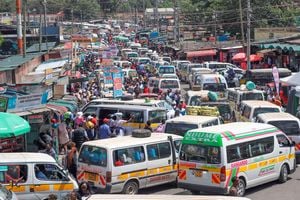
The need to show one’s village mates how successful one has become often leaves many people in deep debt holes. FILE
They report to the village for the December festivities exuding sophistication, splurging money they sometimes borrow to buy many things they do not necessarily need, and entertain friends, just to show off.
Some come driving hired cars; nothing wrong with it, but they pose as if they own the Jeeps or Toyota V8s. All this is to make an impression in the village.
The habit is more pronounced among the lower middle class, and once the festivities are over, they are broke and struggling to pay bills. Some start negotiating for refunds.
According to a director at the Rwathia Distributors in Nairobi, Kanene Kabiru, the festive season comes with a spendthrift spirit that leaves many people in financial agony but is a boon to shylocks and traders.
“When I tell you that the festive season comes with a spending madness, take me seriously,” Mr Kabiru who is in the business of selling beer, food, and lodgings, told Nation.Africa.
“To make my point sink, we usually double our sales target during festive seasons so that our workers can take a cue and nudge customers to spend more,” he says.
After such spending, Mr Kabiru reveals that there are those who later sneak into the manager’s office to negotiate for a refund.
“A guy spends more than Sh200,000 from the eve of Christmas day to New Year, then he shows up later, armed with a logbook asking to be refunded about Sh10,000 to sort out his financial mess,” he says.
Mr Michael Nduati, an accountant, is one of the city returnees who learnt the hard way.
“My turning point was in 2021. I arrived at my Ngurwe-ini home armed with Sh100,000. I was in my early 30s then, a bachelor,” he says.
Mr Nduati had hired a car, which cost him Sh2,000 per day.
“I would spend an additional Sh2,000 a day on fuel. For eight days, I wasted money that I ended up getting stuck in the village, in jail for two months…” he tells Nation.Africa.
He would start his day at a local bar entertaining a legion of alcohol-thirsty village friends. He would then move to the nearby Kabati town for more exploits.
On day six of his festive adventures, he ended up causing an accident, got arrested, charged with causing death by reckless driving, and was in remand for two months.
“By the time I was done with the courts, I had been sacked from my Nairobi job, and the car hire company was demanding upwards of Sh300,000 as repair fees since the insurance company declined to compensate for damages,” he says.
A year later, he found a new job and God.
“I fear the chaos that comes with the December holidays. I would rather go into a forest to fast and pray than party,” he says.
Kigumo Sub County police boss Mr Kiprono Tanui says the festive season makes many people reckless and careless.
“Every seasoned police officer will tell you that festivities come with bizarre financial incidents. The most common reported incidents are guys having their alcohol spiked and ending up losing cash and valuables,” he says.
He adds that some city returnees are robbed as they tend to brandish wads of cash in bars. Others show off wads of cash but refuse to pay bills and end up being frog-marched to police stations by bar owners.
Then some borrow to spend.
Spending discipline
Ms Mary Karinga, a shylock, says December is her most profitable month. She has been in the business for 12 years and she says she never fails to earn at least Sh100,000 profit every December.
“This business of lending money has no legal backing. So it means you must seek good collateral from your clients. During the festive season, my top customers are those from cities,” she says.
Ms Karinga reveals that she gives loans equivalent to 40 per cent value of the collateral.
“If you want Sh40 from me as a loan, you must leave me security worth Sh100. This is to cushion me from being transformed into a buyer of those items used as collateral,” she says.
The most valuable item that has been left behind as collateral is a car, she says, and the loans are usually paid up around February.
“After the December holidays, my stores are full of items like laptops, mobile phones, jewellery and even expensive clothes. On top of advanced cash, I usually charge a 30 per cent interest rate per month,” she says.
Mr Wanjumbi Mwangi, a financial coach at NewTimes Coaching Centre says lack of spending discipline is the cause of all these absurdities.
“When you find yourself putting your hard-earned cash in your pockets and start roaming the streets in search of people to spend it with, that state of mind is known as economic madness,” he says.
Grow wealth
He says money earned during the year should be saved or invested to grow wealth rather than wasted.
Mr Mwangi argues that “what made people believe in the devil of spending a fortune on festivities even before they have attained the comfort of paying for basic needs is the virus that breeds economic deaths on earners.”
He says the festive season should be approached with utmost financial discipline and every penny that gets out of your pocket ought to be well thought out.
“I know of people who plunge into debt after the festive season, go back to rented homes to sell their household items at throwaway prices just to survive. And the items had been bought on loan yet to be fully serviced. So you end up paying for a loan whose purchased items has been sold off,” he says.
He warns that you should not drain your savings on unbudgeted expenses in the guise of celebration.
“December is just one month in the 12 that make a year, Christmas, Boxing and New Year days being only three in the 365 days that make a year. There’s no sane reason as to why you should find yourself in an economic mess because of only three days,” he says, “you end suffering because of bad choices.
Learn how to save, acquire assets, and find multiple sources of income...be responsible and cease living as if there was no tomorrow.”









